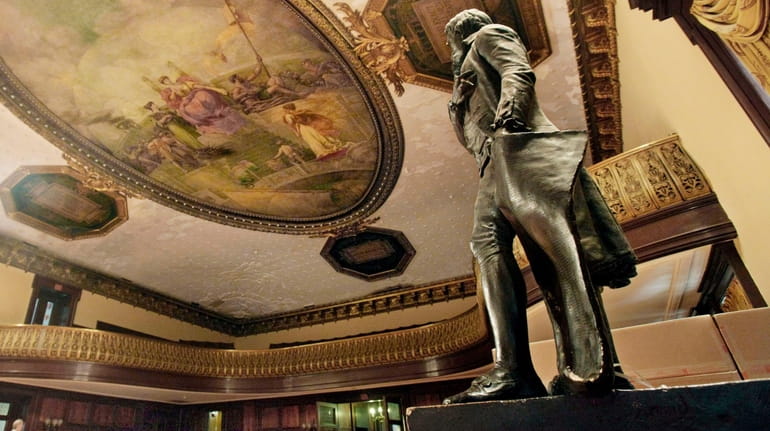Statue's move shows shift in NYC racial politics

The New York City Council's vote to relocate Thomas Jefferson's statue from the Council chamber in City Hall to the New-York Historical Society symbolizes the dramatic shift in America's racial politics. Credit: AP/Richard Drew
Thomas Jefferson’s statue is leaving the New York City Council chamber at City Hall, where it has stood for 100 years, because of the Founding Father’s history as a slaveholder. The City Council’s vote to relocate the statue to the New-York Historical Society is emblematic of the dramatic shift in America’s racial politics in the last few years, and even in the last year. But is this a move that points the way to a better and morally complex understanding of our past, or a more simplistic and moralistic one?
Of all the signers of the Declaration of Independence, Jefferson — who was also its principal author — may embody the contradictions of the American Founding more than anyone else. He penned the Declaration’s ringing assertion that "all men are created equal" and that liberty is an "inalienable" human right. He also held hundreds of humans in violently enforced bondage and expressed the view that Africans were mentally and physically inferior to whites. Despite his racism, he fully understood that slavery was a moral atrocity; yet he not only practiced it but presided over its entrenchment in the American Republic.
Historians have long clashed over Jefferson’s character. Pulitzer Prize-winner Annette Gordon-Reed, a leading Black historian, has insisted on seeing him as a complex figure whose achievements should be honored despite his flaws. (Gordon-Reed has opposed the removal of the statue from City Hall, though she sees its relocation to the Historical Society as the best alternative.) Paul Finkelman, president of Philadelphia’s Gratz College, described Jefferson in a 2012 newspaper article as a "creepy, brutal hypocrite" who, despite sometimes paying lip service to abolition, was committed to the preservation of slavery.
In fact, in the first half of his public career, Jefferson repeatedly expressed anti-slavery sentiments and denounced the British crown for refusing to stop the importation of enslaved Africans into the colonies. His original draft of the Declaration listed the slave trade as a grievance against King George, in a passage removed in deference to proslavery Southern delegates. Yet as president of the United States, and later elder statesman, he maintained a public silence on the issue. Whether this was because of his own interests as a wealthy slaveholder or belief that acceptance of slavery was a necessary political compromise, the taint of hypocrisy remains.
Yet, paradoxically, Jefferson’s assertion of human equality and liberty in the Declaration inspired opponents of slavery in the United States and Europe. Decades later, Southern proslavery defender George Fitzhugh branded Jefferson "the architect of ruin," arguing that his rhetoric led directly to abolitionism.
To Jefferson foes today, he symbolizes a founding rooted in racism and oppression. The opposite view is that slavery and racism were a Colonial legacy which the Founding failed to overcome — but to which the Declaration’s ideals offered a radical challenge.
Jefferson’s banishment in New York does not end this debate, but it is likely to have a negative effect on America’s already frayed political discourse. On the right, it will boost claims that the progressive "reckoning" on race is an attack on the American Founding and an attempt to delegitimize our system of government. On the left, it will boost the notion that historical figures should be "canceled" if they don’t meet present-day moral standards. And it will reinforce the polarization between the two Americas.
Opinions expressed by Cathy Young, a contributing editor at Reason magazine, are her own.

